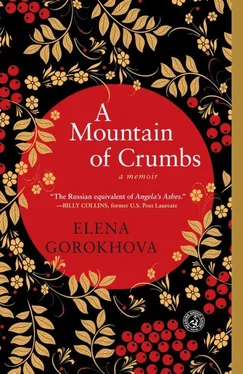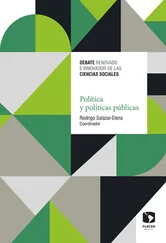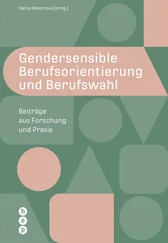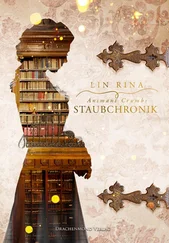I stand on the other side of the world, looking back, saying goodbye. I think of the bulky clouds chugging over the city toward the Baltic Sea, pausing over my courtyard. I think of pocked walls, windowsills covered with soot, crumbling stairs leading to doors permanently barred. I think of the dilapidated sandbox in the middle of the playground. On its ledge crouches a small girl with braids. I know that face: green eyes slightly slanted, betraying the drop of Tatar ancestry in every Russian; faint freckles, as if someone had splashed muddy water onto her skin.
She looks up at me, and the bows in her skinny braids flutter like butterflies. I squat next to her, but the freckles grow darker, a wave of pink floods her cheeks, and her slanted eyes evade mine. She is tense and distant, like the still lindens behind her, like this mute courtyard, like prematurely aged Leningrad. A flock of pigeons pecking at the dirt lift their wings and with a startling clatter rustle up to where the wind rattles over the rooftops. We sit there in the sandbox, on different sides of the world, caught in a time warp—both waiting, both staring at the square of the courtyard sky and wondering what lies beyond it.
When I look back again, my family and friends are no longer visible. All I see through the horseshoe of the broken metal detector, all that is left of my country is a glare of glass.
MY MOTHER WALKS AROUND my house switching off lights. She unloads my dishwasher, sweeps the leaves off the patio, and feeds the dog. She arrived here twenty-one years ago, when I waddled through my last weeks of pregnancy, her hair as white as our winter courtyard. According to my sister, it was my divorce from Robert—our different brains, the hot strangeness of Texas—that precipitated that dramatic change in hair color. My remarriage to someone she hadn’t met, my husband of now twenty-eight years, did not make things better. No one could believe that my mother’s hair was brown and then a month later, white, and then brown again once she settled with us in Nutley, New Jersey.
On the way home from Kennedy Airport, where she landed in June 1988, after we rolled across Manhattan toward the Lincoln Tunnel, a young woman in tight shorts approached our car at a red light on Forty-second Street. My husband turned his head toward her, and as she lifted her tank top above her chest, my mother winced and stiffened. I knew what she was thinking. She had been right all along, lying awake at night, combing through newspaper headlines for crumbs of transatlantic news. America is the mouth of a shark, just as Pravda had promised.
Much has happened since then. In 1991, we watched the Red Square barricades on CNN and gaped at Yeltsin perched on an armored vehicle with his arm thrust into the future in front of the Moscow Parliament called the White House. After that, the map of the Soviet Union shrank at the edges, Leningrad became St. Petersburg again, and Pravda ceased to exist. The English department of my university opened a private division where learning English is no longer free; the dean turned from guarding the party standards to investing in privatized oil companies. Marina answered a personal ad from a Louisiana newspaper and married a good man who loves her cooking and her sewing. She gave up acting and now devotes her talent to cultivating persimmons and tomatoes in a suburb of New Orleans. The rate for international phone calls dropped from three dollars a minute to two cents.
My mother still reuses paper napkins and plastic bags from the supermarket produce section, neatly folding and piling them under her bed. In her basement apartment, she reads memoirs about the Great Patriotic War and watches Russian National Television, which is again owned and controlled by the government, just as it was when I lived there. Between Moscow news and militia dramas, she fills a notebook with stories from her past. Every week, she dials her sister Muza and her stepdaughter Galya back in Russia and tells them all about our life here. She tells them about her ninety-fifth birthday party, when Marina flew here and cooked for two days; she mails them packages with gloves and sweaters, the necessary warm things.
She no longer needs to control and protect. There are no commissars and no lines bristling with elbows; there is no KGB, or shortage of mayonnaise. But old habits linger, and I have to catch myself not to react as I used to when out of the deep new pleats of skin gleam the eyes of my Leningrad mother. Every time I load her shopping cart with buckwheat and cottage cheese, she questions the prices and scrutinizes her receipts in search of errors, ready to find she’s been deceived by greedy cashiers. She gives us a slant-eyed look when we go to a restaurant, in brazen disregard of the refrigerator full of perfectly good food. But she is also practical, my mother. She knows her life is good, and as her saying goes, “When things are good you don’t search for better.” On holidays, she buys us cards with puppies and roses. To help me, she cuts out quick dinner recipes and piles them on the kitchen counter, along with advice on college majors for my daughter from the Russian-language newspaper published in Brooklyn.
I am the one now who worries about scarves and schools, soup and order. I am the one expected to protect and control. In my head, pictures of the perfect life grow like our dacha strawberries, in model rows. I want my daughter to speak Russian, to read Turgenev, to memorize Pushkin’s verse the same way we memorized it in school. I want her to love theater and spend nights in the kitchen pontificating about personal happiness and the meaning of life. I want to infect her with the germ of Russia so she stops being American and becomes like me.
But I don’t. My daughter’s native language is English, and KGB and Pravda are just the names of expensive bars in New York.
In my New Jersey house, with my mother’s apartment the size of our place in Leningrad, we all enjoy privacy, something I tried to find in the Russian language and my Russian life, something that didn’t exist there. I’m glad I left that life twenty-nine years ago; I’m happy my family is here with me. I am closer to my mother and sister now than I ever was in Leningrad. But then, we are probably not the same people we were back in Russia. In our private American space, we can splice the cleaved halves of our souls and heal; we can change if we want to—transform ourselves, as my actress sister knows how to do—and no one will say we’ve betrayed the collective. We can simply live, and keep the door open, and wait. We can be in flux, just like the new Russia.
“Whatever happens, happens for the best, as Mamochka used to say,” murmurs my creased, once again white-haired mother. Her mamochka, my grandma, as soft and wrinkled, smiles at us from a photograph on the wall, which hangs next to my young mother’s portrait, painted by her brother Sima. We don’t talk about such things as forgiveness, understanding, acceptance. We simply sip black currant tea, my mother’s favorite, and I don’t say anything to question Grandma’s wisdom.
I AM DEEPLY GRATEFUL TO my agent, Molly Friedrich, extraordinary in every way, for taking a chance on this first memoir and for guiding me ever since; to my editor, Priscilla Painton, for her insight, grace, and sharp eye; and to Jacobia Dahm, my reader who first called it “a book.” My gratitude also goes to Victoria Meyer, executive director of publicity at Simon & Schuster, for her enthusiasm about the book, and to Loretta Denner, for her exactitude and style. Lucy Carson, Michael Szczerban, and Dan Cabrera, thank you for your support.
The inspiration for this memoir came from Frank McCourt’s seminar at the Southampton Writers Conference, where the intelligence and energy of my exceptional classmates challenged expectations and created magic. I have learned from the conference’s many mentors and friends, and I am grateful for their wisdom and gracious advice. My special thanks to Robert Reeves, the conference director, and Jody Donohue, a poet and a friend.
Читать дальше












